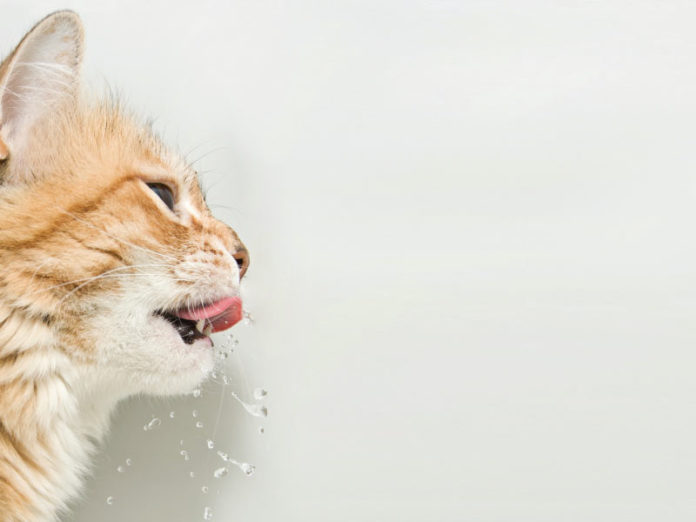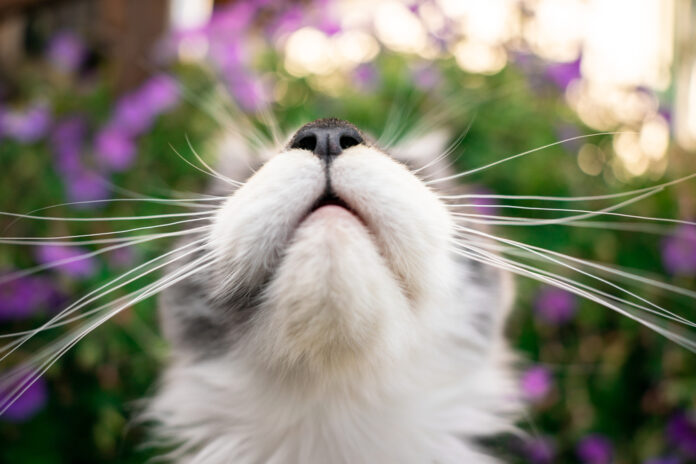GERD in cats

Even cats can suffer from acid reflux or gastro esophageal disease (GERD).
As I watched our cat Cici grooming her paw, I noticed something wasn’t right. She seemed to be pawing at her mouth rather than licking at her foot. Suddenly, she flicked her head and a string of saliva swished through the air. Then she crouched down and started coughing. I was taken aback to say the least, especially as Cici repeated these actions several times as I looked on.
A number of things ran through my mind as to the possible cause of Cici’s alarming behavior. Was something stuck in her mouth or throat? Was she choking? Were her teeth bothering her? Was it a hairball? Had she ingested something poisonous?
Any and all of these might have caused what I was witnessing. For example, drooling and pawing at the mouth can be signs of oral pain and discomfort brought about by advanced periodontal disease. A hairball can cause coughing and salivation, as can a foreign object lodged in the throat. Drooling can also signify nausea or even mouth cancer. The only way to be sure is to take the cat to the vet, which is what I did with Cici.
A diagnosis of GERD
An x-ray revealed Cici was suffering from acid reflux or gastro esophageal reflux disease (GERD). It’s caused by a backup of gastric fluids into the esophagus. While veterinarians aren’t sure what causes it, one theory is that cats with GERD have a weak esophageal sphincter, the muscle that prevents stomach acids and food from flowing back up the esophagus. GERD is very uncomfortable for the cat, and along with symptoms of drooling, coughing and difficulty swallowing, she may vomit more than normal, lose her appetite and drop in weight.
Diet is key
Because my current vet is conventional, Cici was prescribed medications including a gastric acid inhibitor and an antibiotic to soothe and protect the lining of the esophagus. However, I wanted to take a more integrative approach so I did some additional research and learned that diet is a primary key to managing GERD in cats.
Always visit the vet
Given that many other conditions can give rise to the same or similar symptoms as GERD, it’s important to get your cat to a vet as soon as possible – especially since anything that causes her to drool, cough, throw up, or go off her food must be causing her considerable discomfort. “If you notice any change in your cat’s usual behavior or activity level, always take her in for an examination right away,” says veterinarian Dr. Stefani Schwartz.
“I recommend a fresh, organic, nutritionally-balanced, whole food species-appropriate diet supplemented with organic herbs and nutraceuticals specifically selected to treat and remedy the symptoms of GERD,” says integrative veterinarian Dr. Karen Rosenfeld. She adds that low quality commercial foods and treats can further aggravate GERD, and that a homemade diet is best for cats with this condition. Her suggestion is to give the cat lean ground meat from organic pasture-fed animals, and add kefir, fresh sauerkraut or even some natural honey to help soothe the lining of the esophagus. (Note: before switching any cat to a homemade diet, it’s extremely important to work with a veterinarian who is well-versed in feline nutrition, in order to prevent deficiencies and other problems.) “Four to six small meals should be provided daily – no large single portions and no free-feeding,” Dr. Rosenfeld adds.
Along with the correct diet, Dr. Rosenfeld recommends some additional ways to help alleviate GERD. “Don’t allow your cat to be over-vaccinated, and use truly natural solutions for routine oral, fur and skin care. Avoid unnecessary use of conventional drugs such as antibiotics, antacids, and insect and parasite preventatives.”
Although Cici temporarily lost her voice due to acid reflux, it was as good as ever once it returned. We have learned that the best way to manage her GERD is to feed her a healthy natural diet and keep an eye on her for any signs of discomfort.
For more information:
aspca.org/pet-care/cat-care/vomiting
hillviewvet.com/2013/09/01/acid-reflux-in-cats
ottawavalleydogwhisperer.blogspot.com/2013/12/acid-reflex-gerd-indogs-cats-natural.html
petmd.com/cat/conditions/digestive/c_ct_gastroesophageal_reflux
petmeds.org/petmeds-spotlight/fascinating-feline-facts-catsaliva/#.U_s0s2d0xLM



